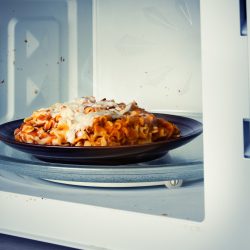Noodle texture greatly affects the overall taste of your pasta dish. Cook times for pasta vary, but we have researched this topic for you and are here to help.
Dry pasta cooks between 5 and 15 minutes, while fresh pasta cooks in 10 minutes or less. The thicker or more complicated the structure of the noodle, the longer the required cook time. Below you will find general boiling time guidelines for several commonly used types of pasta:
Dry Pasta
- Spaghetti, Elbow Macaroni, Egg Noodles, Rotini — 8 to 10 minutes
- Linguini, Penne, Fettuccine — 9 to 13 minutes
- Ziti, Lasagna — 12 to 15 minutes
Fresh/Refrigerated Pasta
- Fettuccine, Linguine — 1 to 2 minutes
- Farfalle, Lasagna — 2 to 3 minutes
- Ravioli, Tortellini — 6 to 10 minutes
There is much more than just timing that goes into whipping up tasty noodles. Follow manufacturer guidelines, use a timer, and stir and taste your pasta regularly for the best results! Keep reading as we delve into how to cook various types of pasta.
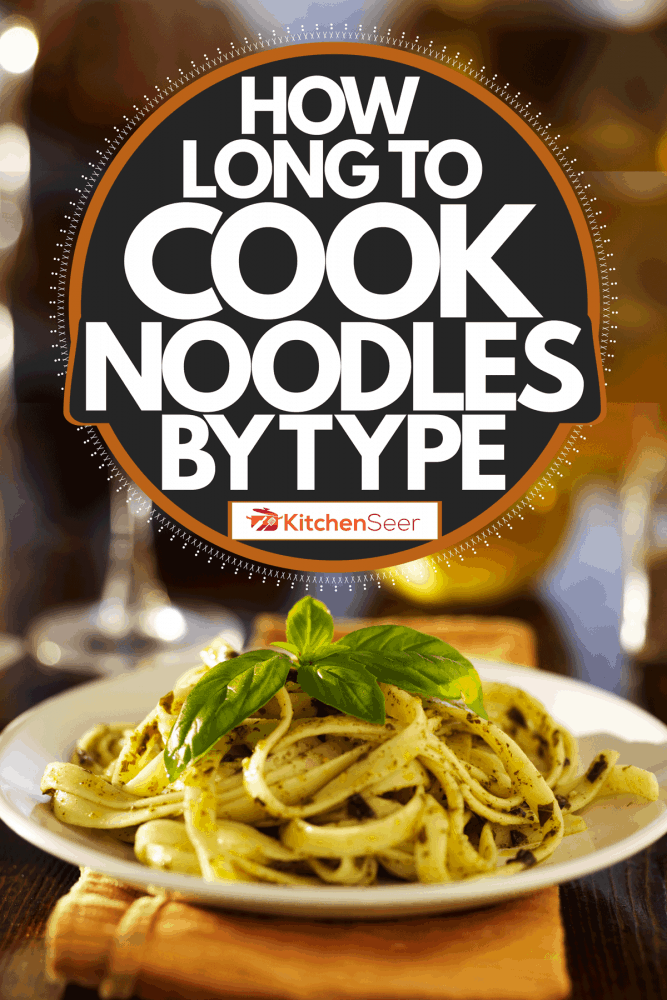
Noodle Cook Times Vary
There are many types and sizes of noodles, as well as different texture preferences. Dry pasta is very common, affordable, and cooks reasonably while fresh pasta is harder to come by or homemade and cooks very quickly.
Cook Times for Dry Pasta
Dry pasta takes longer to cook than fresh pasta because it needs to soften, absorb moisture, and expand. According to Betty Crocker, this process can take anywhere from five to 15 minutes. Smaller, thinner, or more porous pasta like Capellini and Ramen take the least amount of time to cook in only about four to six minutes.
Dry Ziti, Rigatoni, and Jumbo Shells take the longest amount of time to cook, at around 12 to 15 minutes. Dried lasagna noodles also take this long, adding to the already heavy preparation time for the dish. Using no-boil lasagna noodles can make creating a delicious lasagna a much faster process.
Barilla Oven-Ready Lasagne requires no boiling ahead of time. Click here to see this on Amazon.
Fresh and Refrigerated Pasta Cook Faster
Another great way to cut cook times is to use fresh or refrigerated pasta, which is already soft and requires less boiling. Once dried for storage, however, they will take about as long as regular dried noodles to cook. Lasagna, which has one of the highest cook times when dried, cooks in just two to three minutes when fresh.
Some people feel fresh pasta tastes better than dried noodles. Good quality homemade pasta is easier to make with a high-quality pasta maker; check out our 5 best pasta machine brand recommendations here.
Al Dente Pasta Reduces Cook Time Even Further
Some people prefer their pasta soft, while others prefer it chewy. Originating in Italy, pasta cooked al dente is more firm in texture and is now widely made by professional and home chefs alike. You can achieve this with any pasta type by boiling one to three minutes less than recommended.
Common Pasta Cooking Errors and Their Fixes
There are various ways to keep from ruining your noodles as well as ways to correct these common issues once it's too late for preventative measures. We have provided some tips and techniques below to help you cook up better-tasting pasta.
Can You Cook Noodles Too Long?
Noodles can be overcooked, resulting in an unsavory texture. Sometimes when noodles are too far overcooked, they will become completely unusable. Overcooked noodles are soft, mushy, and very sticky. They will come apart when trying to stir or toss.
You can save some overcooked pasta, but other noodles that are too far overcooked will need to be discarded. They are safe to eat but will have poor texture and flavor. The soft and sticky nature of over-cooked pasta does not mix well with sauces.
If noodles are only slightly overcooked, there are a few ways to correct the issue. Put noodles with ice in a strainer and run under water until the pasta is fully cooled. You can also sautee your overcooked pasta on medium heat until the noodles regain some of their original firmness.
If overcooked noodles are too soft to save with an ice bath or sauteeing, you can transform them into a casserole or baked pasta dish. Noodles in these dishes are meant to be soft and are not expected to be chewy or firm. Lasagna, Penne, and Ziti noodles work well in casseroles and pasta bakes.
How Do You Not Overcook Noodles?
The best way to avoid overcooking noodles is to use a timer and to taste them frequently during cooking. If your noodles are store-bought, the time provided by the noodle manufacturer is generally a safe guideline to start with. Set a timer for a minute or two less than the suggested time and go from there.
Check out this super cute, no-battery, mechanical kitchen timer! Click here to see it on Amazon.
If you plan on heating sauce with your cooked noodles, make sure to boil the noodles a few minutes less than recommended. The noodles will continue to cook while you heat the sauce in the same dish, so this is an important step to avoid overcooking your noodles.
How Do You Fix Undercooked Noodles?
Undercooked noodles can easily be fixed if caught quickly. If pasta is strained, start a new pot and bring the water to a boil as fast as possible. Add the undercooked pasta back into the pot and cook for as long as needed. You can cover the pan with a lid to hold in as much heat as possible and shorten the time needed to finish cooking.
You can continue to cook or bake your undercooked pasta once it is covered in sauce, as well. Add a small amount of water to the dish if it seems too thick to prevent burning and stir regularly. Do not bring the sauce and pasta to a full boil; allow it to cook at medium heat until finished. Baking sauce-covered pasta in the oven is another great way to finish cooking undercooked noodles.
Quick Tips for Making Perfect Pasta
There are some basic tips that most cooks are aware of when preparing noodles. For instance, it is commonly known that you must wait for the water to boil before adding the pasta. Also, we have reviewed the importance of tasting and feeling the pasta's texture as it cooks and using a timer. A few other important tips for cooking pasta are included below.
Do You Cover Noodles When Boiling?
It is safe to cover noodles when boiling, but the starch in the noodles will cause them to stick together if covered and left without stirring. It is advised to stir regularly during the noodle-cooking process to avoid large clumps of stuck-together noodles.
Using a lid on your pan will help the noodles to cook faster and more thoroughly by trapping in the heat that would otherwise be escaping out the top of your pan. If you are careful to make sure to stir regularly, a lid can be a great help for cooking pasta.
Use Salt and Oil When Cooking Pasta
Salt is used to make your pasta more flavorful. Add salt to the boiling water before adding the noodles to the pan. According to Taste of Home, you should add about 1-1/2 tablespoons of salt for every pound of pasta for the best results.
Oil is also commonly used when preparing pasta. Olive oil is a very popular choice and keeps noodles slick and separated while fighting stickiness. Oil in the pan helps keep the water from boiling over onto your stovetop. If preferred, however, you can instead add oil after the pasta has been cooked. This technique can be beneficial because sauce may have trouble sticking to your pasta if oil is added during the boiling process.
Should You Rinse Pasta After Boiling?
Pasta being used for hot dishes and with sauces should not be rinsed after cooking. The starch coating on these noodles helps adhere to and absorb the sauce, which makes for an overall tastier dish.
Pasta can be rinsed after boiling if being used in a pasta salad or stir fry. Rinsing noodles prevents them from cooking any further and keeps the starchy coating on noodles from sticking together, so this can work well for cold pasta dishes or noodles that will be re-heated or pan-fried.
Pasta Pan Size and Water Level
This high-quality pasta pan comes complete with a strainer lid. Click here to see it on Amazon.
Make sure the pan you choose has adequate space for expanding noodles and bubbling water. Also, make sure to use a reasonable amount of water when cooking pasta. Water will evaporate during boiling, so make sure to account for this loss when eyeing how much water to use and always make sure there is enough water to fully cover the pasta while cooking.
Pasta Cook Times
Cooking great pasta takes about five to 15 minutes and yields the best results when these tips and techniques are closely followed. If you found this post on noodle cook times interesting, perhaps you're now considering whether to use fresh or dried pasta — our article on if homemade pasta is cheaper than store-bought may help you decide.




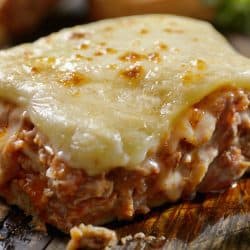
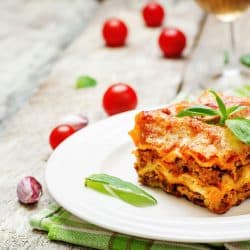
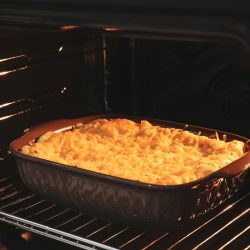
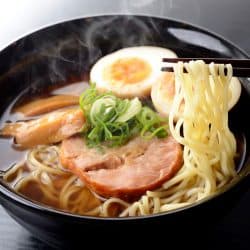
![stacked layers of flat pasta, ground beef tomato sauce, cream and cheese. How Long Should You Cook Lasagna [Including The Pasta Noodles & Time In Oven]](https://kitchenseer.com/wp-content/uploads/2021/04/stacked-layers-of-flat-pasta-ground-beef-tomato-sauce-cream-and-cheese.-How-Long-Should-You-Cook-Lasagna-250x250.png)
